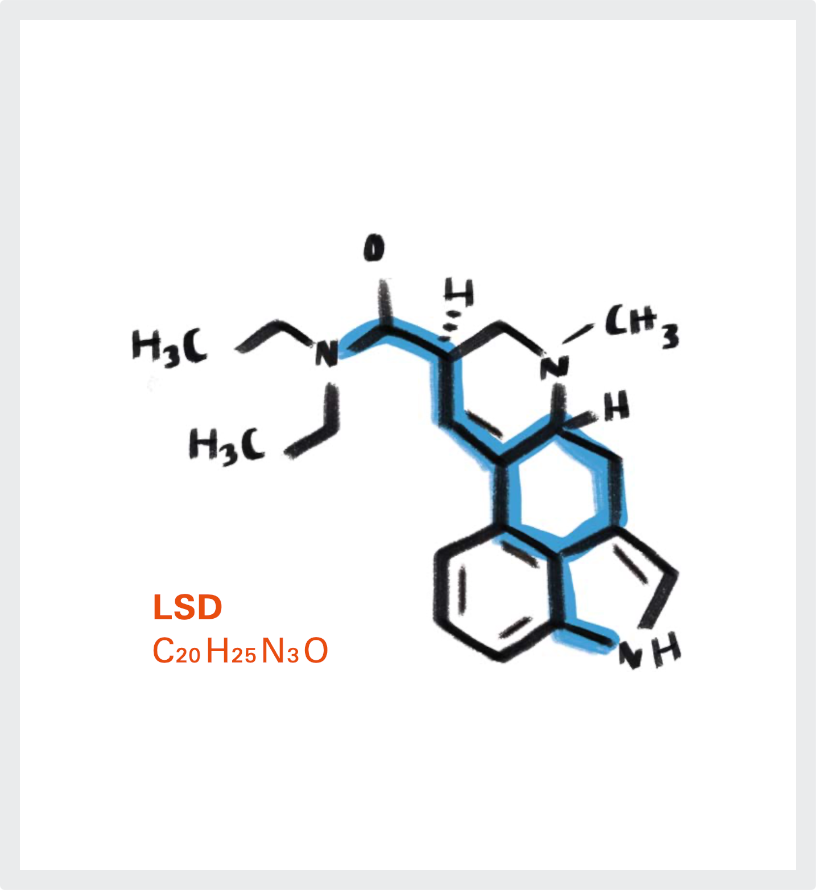
Our research focuses on the effects of hallucinogens and entactogens in humans. More specifically, we are investigating the acute effects of LSD and MDMA (particularly neuronal correlates measured with fMRI) and potential therapeutic effects of LSD in anxiety and depression. Furthermore, we systematically assess the evidence for neurotoxic effects of MDMA.
We have been involved in several studies on the effects of MDMA, LSD, mescaline and psilocybin in healthy participants. All studies are conducted in close cooperation with the research group of Prof Matthias Liechti, Division of Clinical Pharmacology, University Hospital Basel. Outcomes of these studies included acute subjective effects, physiological effects, safety, and fMRI correlates of acute drug effects. Among others, this research demonstrated safety and feasibility, distinct (dose) profiles of subjective drugs effects and shed some light on neuronal correlates of acutely induced drug effects. We could also show that LSD induces long-lasting positive effects in healthy persons.
Currently, we aim to carry results of these phase-I-studies forward to clinical application: We have been involved in a phase-II-study investigating LSD as a treatment for anxiety associated with life-threatening diseases and generalized anxiety disorder . Furthermore, we are conducting a phase-II-study which investigates LSD as a treatment for patients suffering from major depression. The primary hypothesis is that two administrations of LSD can induce long-lasting symptom reductions in anxiety and depression.
COMPLETED PROJECTS
- Psychological, physiological, endocrine, and pharmacokinetic effects of LSD in a controlled study (link)
- Effects of methylphenidate, modafinil, and MDMA on emotion-processing in humans: A pharmaco-fMRI study (link)
- Neuronal correlates of altered states of consciousness (link)
- LSD treatment in persons suffering from anxiety symptoms in severe somatic diseases or in psychiatric anxiety disorders (link)
- Role of dopamine, serotonin and 5HT2A receptors in emotion processing (link)
- Role of the serotonin 5HT2A receptor in LSD-induced altered states of consciousness (link)
- Direct comparison of altered states of consciousness induced by LSD and psilocybin (link)
- Comparative acute effects of LSD, psilocybin, and mescaline (link)
- LSD therapy for persons suffering from major depression (link)
RUNNING PROJECTS
- TherPsySe study: The Role of Personal Experience for the Therapeutic Attitude in the Context of Substance-assisted Therapy Training (link)
LYTA study: Investigating efficacy and microstructural plasticity of LSD treatment in patients with alcohol use disorder: A multicenter, double-blind, randomized, active-placebo controlled phase II neuroimaging study (link).
- DMT study: Investigating the role of the psychedelic experience in the antidepressant response in patients with major depression: a placebo-controlled factorial trial with DMT masked with propofol
BACKGROUND
After the discovery of LSD by the Basel chemist Albert Hofmann in the 1940s, psychiatry placed high hopes on this compound, especially as possible treatment options for various mental diseases. Clinical studies showed evidence of positive long-term effects on depressive symptoms, anxiety, and substance use disorders. Similar effects were seen after administration of the related hallucinogenic agents psilocybin and mescaline. Interestingly, it was observed that limited administrations of these substances resulted in positive long-term effects in several mental diseases. Thus, this approach appeared to be fundamentally different from other known psychiatric medications that require administrations on a daily basis. Although psychiatry has progressed greatly during the twentieth century, there are still patients who do not respond well to established interventions and are therefore considered treatment-resistant. A few years ago, there was a worldwide resurgence in this area of research and our team has been on the forefront of this development.
![[Translate to English:] Delysid](/fileadmin/_processed_/1/5/csm_LSD_Delysid_Prospekt_von_Sandoz_1964_Kopie-1_e3859e3517.png?1720623760)
![[Translate to English:] Psilocybin](/fileadmin/_processed_/a/8/csm_Psilocybe_Labor_1abf092e13.jpeg?1720624080)
![[Translate to English:] Delysid](/fileadmin/_processed_/1/8/csm_Delysid_Ampulle_d27ad99a86.png?1720624710)
![[Translate to English:] Albert Hofmann](/fileadmin/user_upload/kfs.medizin/Alberts-Hofmanis.jpg?1633714601)

